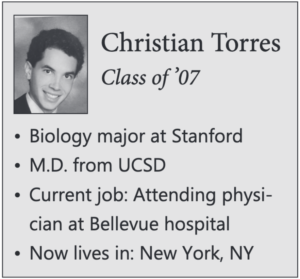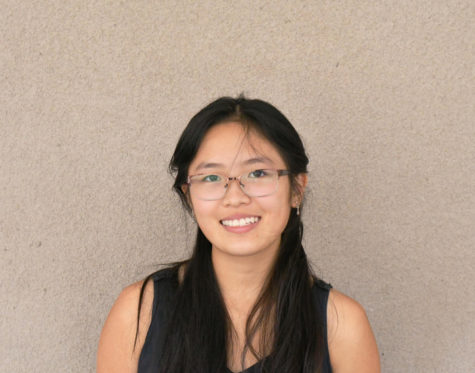Torres works as doctor in New York City
December 17, 2021

On weekday mornings, Christian Torres wakes up to a full agenda. The streets of New York City are busy, but not more so than Torres himself—by the time he makes it to Bellevue hospital, he already has patients waiting to see him.
Within the capacity of his specialization as a general internalist, Torres serves as a primary care doctor and a hospitalist. As a part of both roles, he coordinates with staff, in order to help patients receive the support they need.
“I’ve met so many different people from different backgrounds in my work as a doctor,” Torres said. “So many of my patients come from communities where they are underserved, where they don’t have access to healthcare. So when I talk to them I get to learn so much about them and their culture.”
Depending on what assignment he’s on, Torres spends his morning seeing seven or eight patients in the clinic. The work he is involved in is deeply personal—the intrinsic humanity of every case is part of what Torres finds so fulfilling about medicine, he says. His time in the clinic is littered with little moments of connection. Sometimes his patients will recommend restaurants to him, the names of which he dutifully files away in his head for later.
When meeting with his patients, Torres takes charge, leading them through the process of managing their health.
This authority is a skill he first gained in high school, where he served as editor in chief of The Nexus for three consecutive years, because of the unique circumstances of the first graduating class. Having to lead a brand new paper with no precedent to rely on shaped Torres’ perception of his ability—even now, as a doctor, Torres looks back on his time in The Nexus with a particular kind of fondness.
“I really appreciate the skills I developed from it—writing and communication and leadership— so much so that I still look back on being an editor of The Nexus as being one of the biggest factors of me being a leader in what I do today,” Torres said.
Torres’ actual entry into reporting was completely accidental—as a freshman at Mt. Carmel, a scheduling error forced him to choose between Journalism 1 and geography, and he ended up choosing the former, a class taught by his eventual newspaper advisor, Jeff Wenger, a decision that proved to be the spark that lit his passion for journalism.
Particularly, news coverage of 9/11 helped Torres realize the depth of reporting that went into real-life journalism. He remembers himself sitting in a dimly-lit classroom on the day of the tragedy, watching live reports on the devastation with the rest of his Journalism 1 class. Torres and his classmates were mostly silent, but now and then they discussed what they were watching—not just about how they felt about it, but about the way it was being covered by the media.
“I realized from there, especially as I went forward and got to write about people and their issues, even just high-school ones, the importance of how you frame someone’s story, and the power there was in someone’s story,” Torres said. “In the end, it came down to individual people. What Wenger and other people taught me going forward was about people’s stories and their emotions, and the lessons you could learn from them. I remember hearing the stories of the actual people who had died that day on the news, and that was what really impacted me.”
After choosing to continue his education at Westview, after the school’s opening, Torres joined The Nexus as a sophomore, a choice that proved crucial to his eventual understanding of himself. While he had always been drawn to English and history classes, The Nexus is where his leadership truly bloomed.
“There wasn’t much of a system yet [when Westview opened],” Torres said. “But oddly enough, part of the reason as to why I wanted to go there was to go somewhere new and take on the challenge of that, and make my own course from there.”
In this new, unshaped environment, at the same time as his reporting adventures were taking place, Torres also cultivated a love for biology, an interest that would eventually lead him to pursue a biomedical track in college, even as he continued to participate in journalism by writing news and sports articles for The Stanford Daily, which he became editor-in-chief of in his senior year.
“I thought maybe I was going to combine my love of science with my love of writing by doing health journalism,” Torres said.
This dream was one that lived on in the various internships that he did after he graduated in 2009. In 2010 and 2011, from late fall into early summer, Torres did a new writing internship in New York City for Nature Medicine. After returning home, and then traveling cross-country for another program in Washington D.C, Torres participated in a science policy internship with Research America.
After deciding to stay in D.C, Torres spent a few months doing health and science reporting at the Washington Post, as a part of an internship that turned into a contract job.
Once he got a fellowship with Kaiser Health News, he moved on to more reporting on health policy and health news research. Over the course of his year with the fellowship, Torres covered issues of Obamacare and healthcare equity.
While Torres enjoyed his work, after a couple of years, he realized that even though he loved journalism, it wasn’t really what he wanted to do with his life, he said.
“In my life, there has always been a sort of seesaw between my interest in journalism and my interest in medicine,” Torres said. “And sometimes one was up. Right now, medicine is my priority, and though I am thinking of doing some writing on the side, I think I’ve realized that everything I’ve done with [reporting] has really built up to my [current career].”
Still, he treasures his time as a journalist. His experiences with reporting were what gave him the soft skills that help him succeed as a doctor today, and in this way, ultimately, his two interests are inexorably linked.
“I really do credit being in journalism with eventually getting me into medicine because it was through journalism that I learned how much I liked talking to people and hearing their stories, and how much that made me want to help them and advocate for them,” Torres said. “In many ways, I strongly think that even today, what I rely on is not so much my medical knowledge, which is something that anyone can learn with enough time and effort, but the communication skills that I got way back then.”
In the afternoon, as a part of his position as a clinical assistant professor for NYU’s Department of Medicine in the Grossman School of Medicine, Torres supervises several medical residents, who see their own patients. He listens to them speak about their experiences with patients that day, trying to facilitate their understanding of medicine.
“We discuss their plans, what they think is happening, what they think the diagnosis is, and how they want to manage it,” Torres said. “They run it by me and I do some teaching and then they go back to work with the patient.”
The expertise that Torres refers to for this part of his job comes from his time spent at med school, which he applied to during [year]. The process of applying was, at the time, a challenge for Torres, because of the time he’d taken off from education.
“The application itself is already hard because you’re trying to convince people that you belong in medicine,” Torres said. “But if you haven’t been doing medicine in the past few years, that’s even harder. I came into the process as somebody who didn’t have a traditional path. I didn’t go into college for pre-med, do research, and then apply directly. And that was difficult to explain.”
Eventually, he decided to go to UCSD, where he studied until 2016, specializing in internal medicine. After graduation, he moved to New York City to do his residency, where for the first time, he felt like an adult.
“I remember thinking, the weekend after my first day at work, that this was it,” Torres said. “I am in the city. I am here. I am making a little money, and I’m doing this work, and I’m excited about it.”
With his new position, however, Torres also found additional stressors. His time as chief resident coincided directly with the beginning of the pandemic when New York City was the epicenter of the crisis. Like other healthcare professionals, the weight of the rising cases felt crushing at times, Torres said.
Still, he shouldered on. Through the strength of his support system—friends who reached out to him, friends whom he reached out to—Torres built up resiliency. And at the end of the residency, after the first flare-ups of COVID cases, he found a position at Bellevue, where he now works.
In the early evening, Torres can often be found in meetings related to his work in diversity, inclusion, and health equity, not just for patients, but for doctors and medical students as well. These meetings mainly center around new health equity policies and programs NYU is trying to roll out. Recently, Torres has mostly been involved with recruitment-related work.
“In particular, our goal is to have more diverse trainees,” Torres said. “That means getting people who are underrepresented in medicine into our training programs and helping them help us learn how to take care of underserved populations.”
Torres said he is passionate about what he does—his time at different newspapers before med school informed his perspective of the gaps in the healthcare education system, gaps which he wants to help bridge. Recently, this has felt more and more achievable.
“When it comes to diversity and inclusion work, there’s so much discussion around it now,” Torres said. “I think lately I’ve been feeling more fulfilled by that, because people are more willing to support and invest in it and help move the conversation forward.”
Despite the pressures of his job, Torres finds joy in what he does, and the people that he surrounds himself with.
“I love getting out into the city and going to neighborhoods that I’ve never been to before, and trying a restaurant there,” Torres said. “I’ll often go to the places that my patients mention to me during their visits, and getting to try something new is always really exciting.”
Like on a recent Monday, when he found himself at a taco restaurant, Los Tacos No. 1, eating tacos, and unwinding from the stress of his long day at work.
Despite the stressors of his position, Torres enjoys life—he takes his days and lives them to the fullest. While he looks forward to a future in which he remains deeply involved with medicine, Torres is also open to whatever may come next, whether that is a deeper involvement with health equity or more involvement as a university professor. Whatever the future holds, he is certain that there will be experiences from which he can learn and grow as a person, he says.
“Maybe my purpose will change again,” Torres said. “But for now, I’m happy with where I am.
Ultimately, Torres’ personal philosophy on success has been an anchor throughout the changing tides of his career pursuits.
“I think over time, you realize that it doesn’t matter so much what you’re doing, but your excitement about it and the skills that you have that you can bring to it, and what skills you have to use for that purpose,” Torres said.


